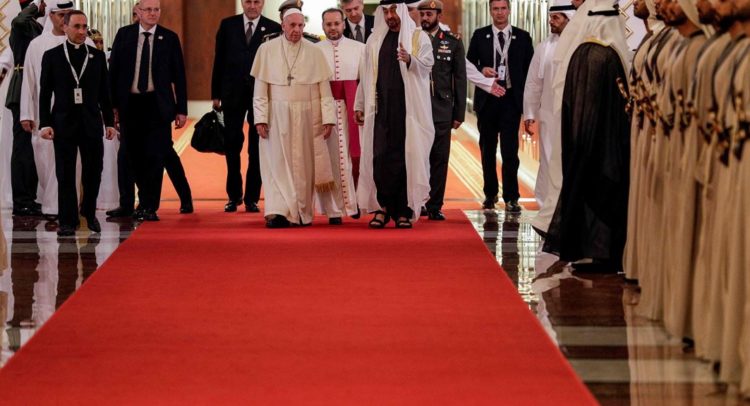Pope Francis landed here on Sunday in United Arab Emirates on a first-ever trip by a pontiff to the Arabian Peninsula,the birthplace of Islam.He seeks to turn a page in Christian-Muslim relations while also ministering to a unique, thriving Catholic community.
The pope touched down in Abu Dhabi for a two day trip during which he will meet leading Muslim clerics and hold an open-air mass for some 135,000 Catholics.
Applausing the visit of His Holiness Pope Francis, Head of the Catholic Church, to the UAE, Mike Pompeo, the United Sates Secretary of State described this moment as “historic moment for religious freedom”.
Abu Dhabi’s crown prince, Sheikh Mohammed bin Zayed Al Nahyan, welcomed the pontiff with smiles along with his Cabinet colleagues and honor guard when he landed around 9:50 p.m. in Abu Dhabi’S Presidential Airport.
Francis is going to participate in a conference on interreligious dialogue sponsored the Emirates-based Muslim Council of Elders, an initiative that seeks to counter religious fanaticism by promoting a moderate brand of Islam. It’s the brainchild of Sheikh Ahmed el-Tayeb, the grand imam of Egypt’s Al-Azhar, the revered 1,000-year-old seat of Sunni Islam that trains clerics and scholars from around the world.
In a video message to the Emirates, Francis paid homage to his “friend and dear brother” Sheikh el-Tayeb and praised his courage in calling the meeting to affirm that “God unites and doesn’t divide.”
“I am pleased with this meeting offered by the Lord to write, on your dear land, a new page in the history of relations among religions and confirm that we are brothers despite our differences,” Francis said.
Francis and Sheikh el-Tayeb are to address the “Human Fraternity Meeting” Monday that has drawn not only Christian and Muslim representatives but hundreds of Jewish, Hindu, Buddhist and other Christian faith leaders. It’s all part of the Emirates’ “Year of Tolerance” and its effort to show its openness to other faiths in a region otherwise known for severe restrictions on religions outside of Islam.
The other plans of Francis in schedule in Abu Dhabi includes,a giant Mass on Tuesday in the city’s main sports arena that is likely to draw some 135,000 people in what some have called the largest show of public Christian worship on the Arabian Peninsula. There, Francis will see firsthand a Catholic community that is big, diverse and dynamic, at a time when the wider Mideast has seen an exodus of Christians fleeing persecution at the hands of the Islamic State terrorist group and others.
Of the over 9 million people now living in the UAE, around 1 million are Emirati while the rest are foreigners drawn to the oil-rich federation to work in everything from white-collar finance to construction.
The Catholic Church believes there are some 1 million Catholics in the UAE. Most are Filipino and Indian, many of whom have left behind families for work and can face precarious labor conditions, which human rights groups regularly denounce.
Francis is expected to centre on issues of religious freedom and fraternity in his public remarks. Unlike all his other foreign trips, he will not deliver a political speech.
Alessandro Gisotti, the Vatican spokesman said the reason was to give greater emphasis to his speech to the interfaith conference. He dodged a question about whether Francis would raise Yemen’s yearslong war in his private talks with the Emirates’ ruler. The UAE is deeply involved in the Saudi-led war in the Arab world’s poorest country, where tens of thousands have been killed and millions face food and medical shortages.
“I don’t know if the Holy Father will confront it publicly or privately, but certainly on many occasions, even recently, he has underlined the need to search for peace in particular to guarantee the humanitarian rights of the population, especially children,” Mr. Gisotti said.
Aid groups working in Yemen hope Francis won’t just rely on his public appeals, but will use his visit to bring his message to the Emirati leadership in person.

